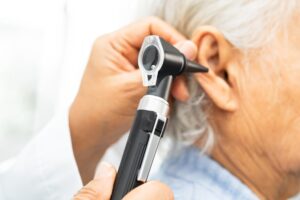Hearing aids are more than just devices; they’re lifelines to a better quality of life. If you’re wondering how long your hearing aids should last, you’re not alone. Many users ask this question, and the answer depends on several factors. But with the right care, you can make the most of your investment.
Let’s dive into the average lifespan of hearing aids, what influences their durability, and expert tips to help you extend their longevity.
Average Lifespan of Hearing Aids: What You Can Expect
On average, hearing aids last between 3 to 7 years. However, this range can vary depending on several factors:
- Type of hearing aid
- Quality of the device
- User care and maintenance
- Technological advancements
If you have rechargeable hearing aids, expect to replace batteries every 4 to 5 years, and plan for new hearing aids every 5 to 7 years.
What Affects the Lifespan of Hearing Aids?
Knowing what influences the longevity of your hearing aids can help you get the most out of them. Here are some key factors:
Daily Wear and Tear
Hearing aids are exposed to various environmental elements throughout the day. Moisture, earwax, and temperature changes can all take a toll on the delicate components of your device, potentially shortening its lifespan.
Maintenance and Cleaning
Proper care is crucial. Regular cleaning and maintenance can prevent many common issues that lead to early replacement. Aim for daily cleanings, with deeper cleanings and professional inspections every 3 to 6 months to keep your hearing aids performing at their best.
Technological Advances
As hearing aid technology evolves, you might be tempted to upgrade for new features, even if your current devices are still functional. Staying informed about advancements can help you decide if an upgrade is worth it.
Changes in Hearing
Hearing loss can progress over time, which may require adjustments or even a replacement of your hearing aids to ensure they continue meeting your needs.
Signs It’s Time to Replace Your Hearing Aids
While proper care can extend the life of your hearing aids, they won’t last forever. Here’s when you might consider a replacement:
- Inconsistent performance or frequent need for repair
- Difficulty adapting to your changing hearing needs
- Outdated technology that no longer suits your lifestyle
- Physical damage that impacts functionality
Expert Tips to Extend Your Hearing Aids’ Lifespan
Want to get the most out of your hearing aids? Here’s what our audiologists recommend:
Daily Cleaning Routine
- Wipe your devices with a soft, dry cloth daily.
- Use a cleaning brush or cotton swab to remove debris from openings.
- Avoid using water or cleaning solutions unless designed for hearing aids.
Proper Storage
- Store your hearing aids in a cool, dry place when not in use.
- Consider using a dehumidifier to remove moisture.
- Keep them away from direct sunlight and heat sources.
Regular Professional Maintenance
Schedule check-ups with your hearing care professional every 4-6 months for:
- Deep cleaning
- Performance checks
- Necessary adjustments
Battery Care
- For disposable batteries: Replace them promptly when depleted and open the battery compartment overnight to let moisture escape.
- For rechargeable models: Follow charging instructions carefully and avoid overcharging.
Moisture Protection
- Remove hearing aids before showering or swimming.
- Use hearing aid covers in humid conditions.
- Consider sweatbands during physical activities.
The Cost Factor: When to Repair vs. Replace
As hearing aids age, you may face the decision of repairing versus replacing. Here’s what to consider:
- Cost of repairs vs. cost of a new device
- Expected remaining lifespan after repairs
- Improvements in technology in newer models
- Changes in your hearing needs
Technological Advances and Hearing Aid Longevity
As technology advances, so does the durability of hearing aids. Newer models boast improved moisture resistance, better battery efficiency, and enhanced sound processing. While these improvements can extend your device’s life, they may also tempt you to upgrade for better features.
Insurance and Warranty Considerations
Before making a decision, review your warranty and insurance coverage:
- Check your warranty period and coverage
- Explore insurance options for hearing aids
- Consider extended warranties for long-term protection
Balancing Longevity with Performance
With proper care, most hearing aids last between 3 and 7 years. Regular check-ups with your audiologist, daily cleanings, and smart storage practices are essential to maximizing your device’s lifespan.
However, balancing longevity with performance is key. As your hearing needs change or technology improves, upgrading your devices may offer better sound quality and convenience, even if your current hearing aids still work. At Colorado Ear Care, we’re here to help you navigate these decisions. Whether you’re considering new hearing aids or looking to maximize your current ones, our expert team is ready to assist with professional care, cleaning, and advice. Book an appointment today and get back to hearing life clearly.




